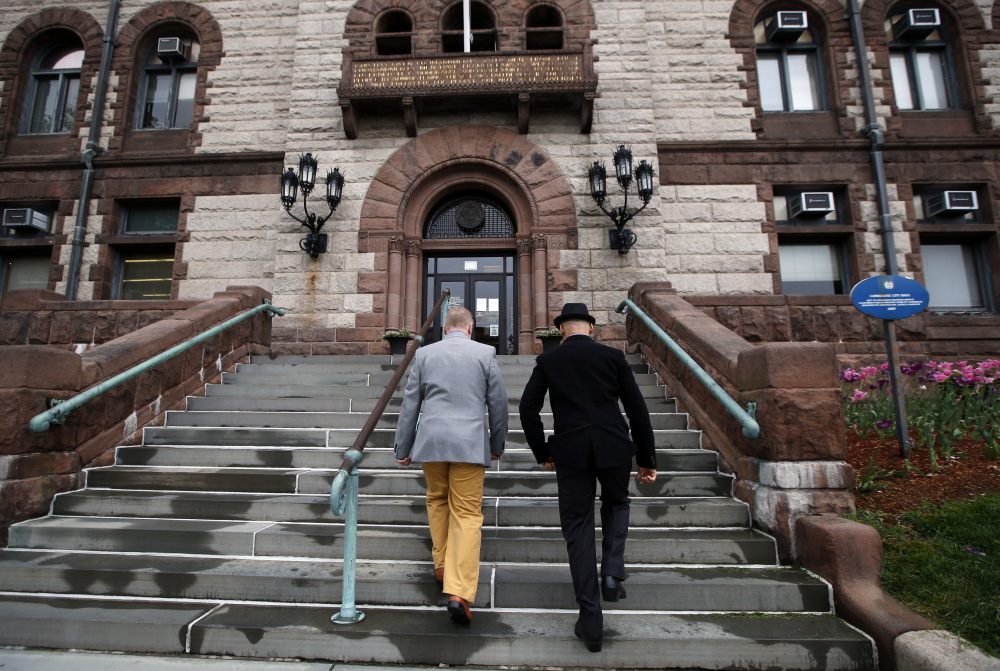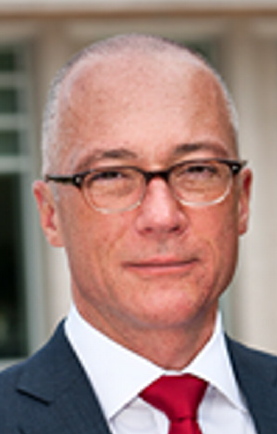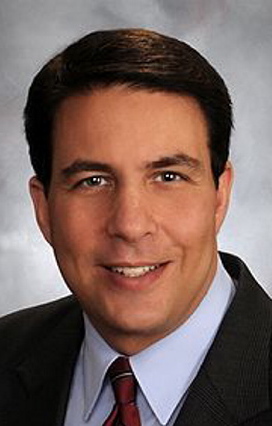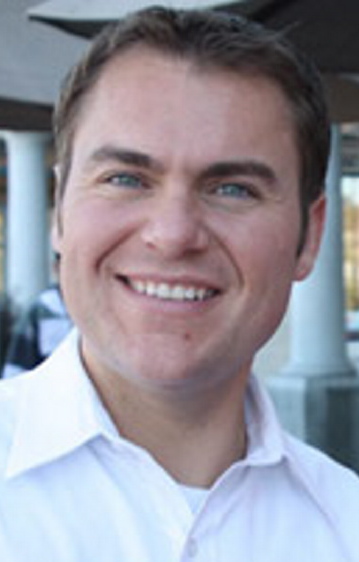BELMONT, N.H. — Dan Innis is standing at the back of the main dining room of the Top of the Town Restaurant as people straggle in for the monthly meeting of the Belknap County Republican Committee.
The aroma of prime rib and mashed potatoes streams from the nearby kitchen and fills the room, which has floral dressings on the windows and an American flag hung on the back wall.
As about three dozen people file in, one woman stops to ask Innis, one of the meeting’s featured speakers, about his position on gay rights and equality issues: Will they be his major focus if elected?
It is a pointed question because Innis is running for Congress. He is gay, and he is a Republican.
His response: “I am running on free-market issues. That’s what I’m focused on,” Innis says. “The social issue has been settled here in New Hampshire.”
The voter is satisfied. “Well, with that answer, I’m very comfortable supporting you,” she tells him before making the way to her seat.
Innis is a hotel owner who speaks with the confident, matter-of-fact cadence crafted during his years as a business professor. He is one of three openly gay Republican candidates who, 10 years after the nation’s first gay marriages were performed in Massachusetts, are vying for offices on Capitol Hill this year.
The three are Innis, who faces former congressman Frank Guinta in the primary to challenge Democratic Rep. Carol Shea-Porter; Richard Tisei, who hopes to be victorious in what will probably be a rematch with Rep. John Tierney, D-Mass.; and Carl DeMaio, a former San Diego City Council member who hopes to unseat Democratic Rep. Scott Peters.
“The fact that the three of us can run for Congress as serious candidates says an awful lot about where we are today as a party,” Innis said Thursday afternoon while taking a break between campaign events.
This relative bumper crop of openly gay Republican candidates comes as the national party continues its public grappling with how to more rapidly evolve on the issue of marriage equality while attempting to hold on to the deeply conservative voters who have for decades made up much of the Republican base.
‘WE’RE SEEING AN EVOLUTION’
“We’re seeing an evolution of the Republican Party that is going to broaden the base and be more inclusive,” said Innis, who noted that the woman’s inquiry at the restaurant was just the second time he’d been asked about his sexuality while on the campaign trail.
The residents who gathered to hear Innis speak on Wednesday night peppered him with questions about the Affordable Care Act, economic regulations, small businesses and the Cliven Bundy saga in Nevada.
But, several of them said after the event, his sexuality was not an issue that will influence whether they support him in the Republican primary.
“Just like any other candidate who we host, our members want to know what Dan is going to do to improve the economy,” said Alan Glassman, the county Republican chairman, who presided over the meeting. Innis’s sexuality, Glassman added, wasn’t relevant.
The politics of sexuality have evolved rapidly in the decade since Massachusetts became the first state to issue marriage licenses to same-sex couples.
In March 2004, just 38 percent of respondents to a Washington Post-ABC poll said that gay marriage should be legal, with 59 percent in support of a same-sex marriage ban. A poll conducted this year found that those numbers had flipped – 59 percent of respondents in a March Post-ABC poll said same-sex marriage should be legal.
That drastic shift in public opinion comes as a flood of judicial rulings have moved to strike down bans on same-sex marriage in states across the country. Since the Massachusetts ruling, 16 other states have legalized same-sex marriage. Meanwhile, judges in seven other states have struck down bans on gay marriage. Last week, federal judges struck down bans in Idaho and Arkansas.
“Right now, we are on the brink of winning nationwide,” said Marc Solomon, the national campaign director for Freedom to Marry, one of the leading organizations pushing for the legalization of same-sex marriage.
SAME-SEX MARRIAGE AND PUBLIC OPINION
Solomon, who worked on the campaign in Massachusetts in 2004, said that the gradual overturn of same-sex marriage bans has been vital to spurring the shift in public opinion.
“Some people had it in their minds that something bad was going to happen to society if same-sex marriage was allowed,” Solomon said. “But as more states have enacted freedom-to-marry laws, the more people have shifted their positions very quickly.”
But despite the evolution of public opinion, openly gay candidates for federal office – especially among Republicans – have remained relatively few. There are eight openly gay members of Congress, all Democrats. This year’s gay GOP candidates say they expect others to emerge in the coming years as the party continues to move away from its bitter opposition to same-sex marriage in the early 2000s.
They say the issue of their sexuality rarely comes up on the campaign trail when speaking with conservative voters and point to recent polling that shows that younger Republicans largely support same-sex marriage – a Post-ABC poll in March found that 60 percent of Republicans younger than 40 support gay marriage.
“There have always been gay Republicans,” Innis said. “What the fact that three of us are running this year says is that the party has come to a place where we feel comfortable running.”
The fact that several gay Republicans are seeking office this year is notable in part because gay voters remain largely skeptical of the Republican Party.
A 2013 Pew Research Center survey found that 76 percent of gay, lesbian, bisexual and transgender Americans see the Republican Party as “unfriendly” toward them. The same poll found that just 10 percent of LGBT people saw the Obama administration and the Democratic Party as unfriendly.
The GOP’s national platform still defines marriage as “a union between a man and a woman,” and last year, Rep. Randy Forbes, R-Va., called on the National Republican Congressional Committee to withhold support of openly gay candidates.
The next day, House Speaker John Boehner, R-Ohio, pledged his support for gay Republicans.
Send questions/comments to the editors.






Success. Please wait for the page to reload. If the page does not reload within 5 seconds, please refresh the page.
Enter your email and password to access comments.
Hi, to comment on stories you must . This profile is in addition to your subscription and website login.
Already have a commenting profile? .
Invalid username/password.
Please check your email to confirm and complete your registration.
Only subscribers are eligible to post comments. Please subscribe or login first for digital access. Here’s why.
Use the form below to reset your password. When you've submitted your account email, we will send an email with a reset code.